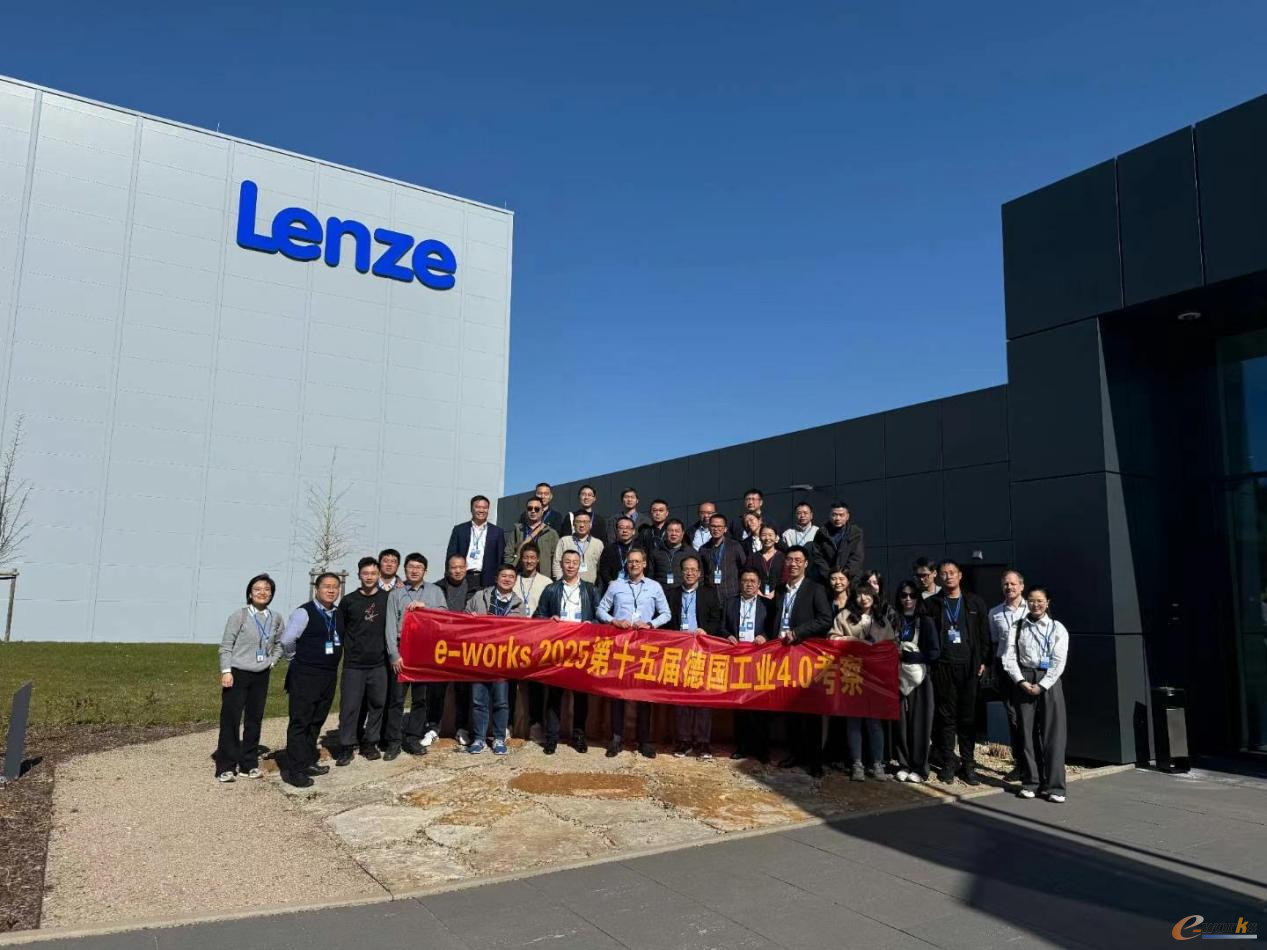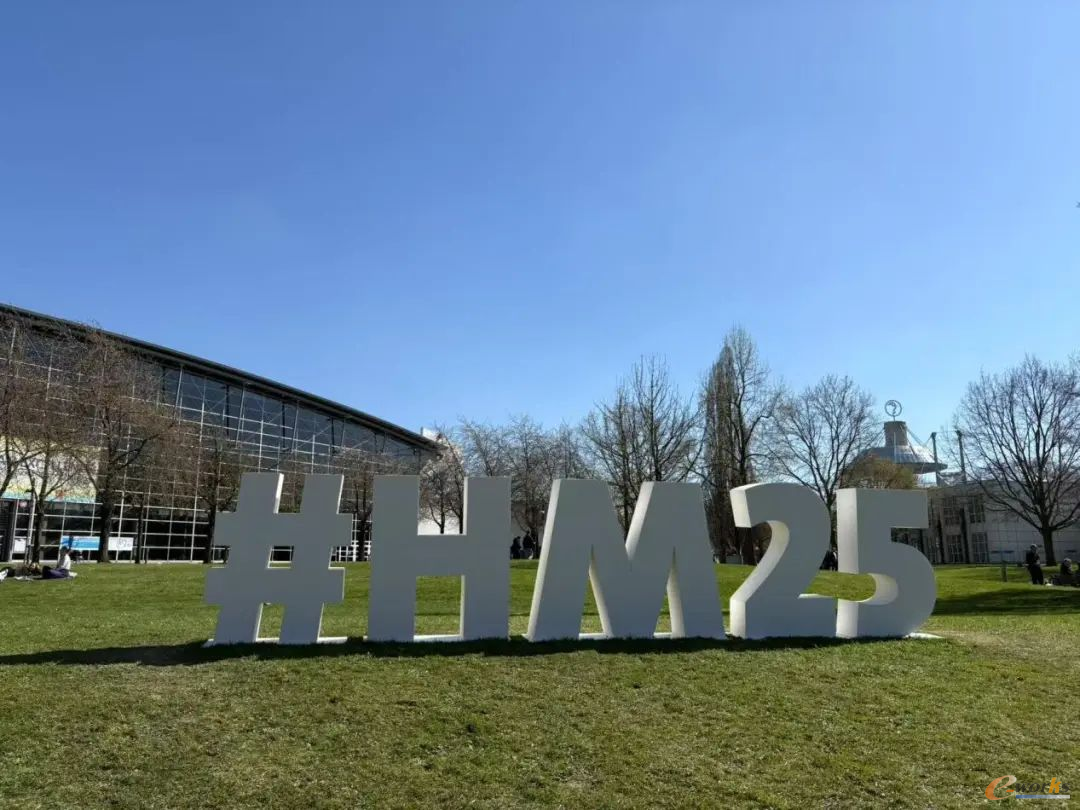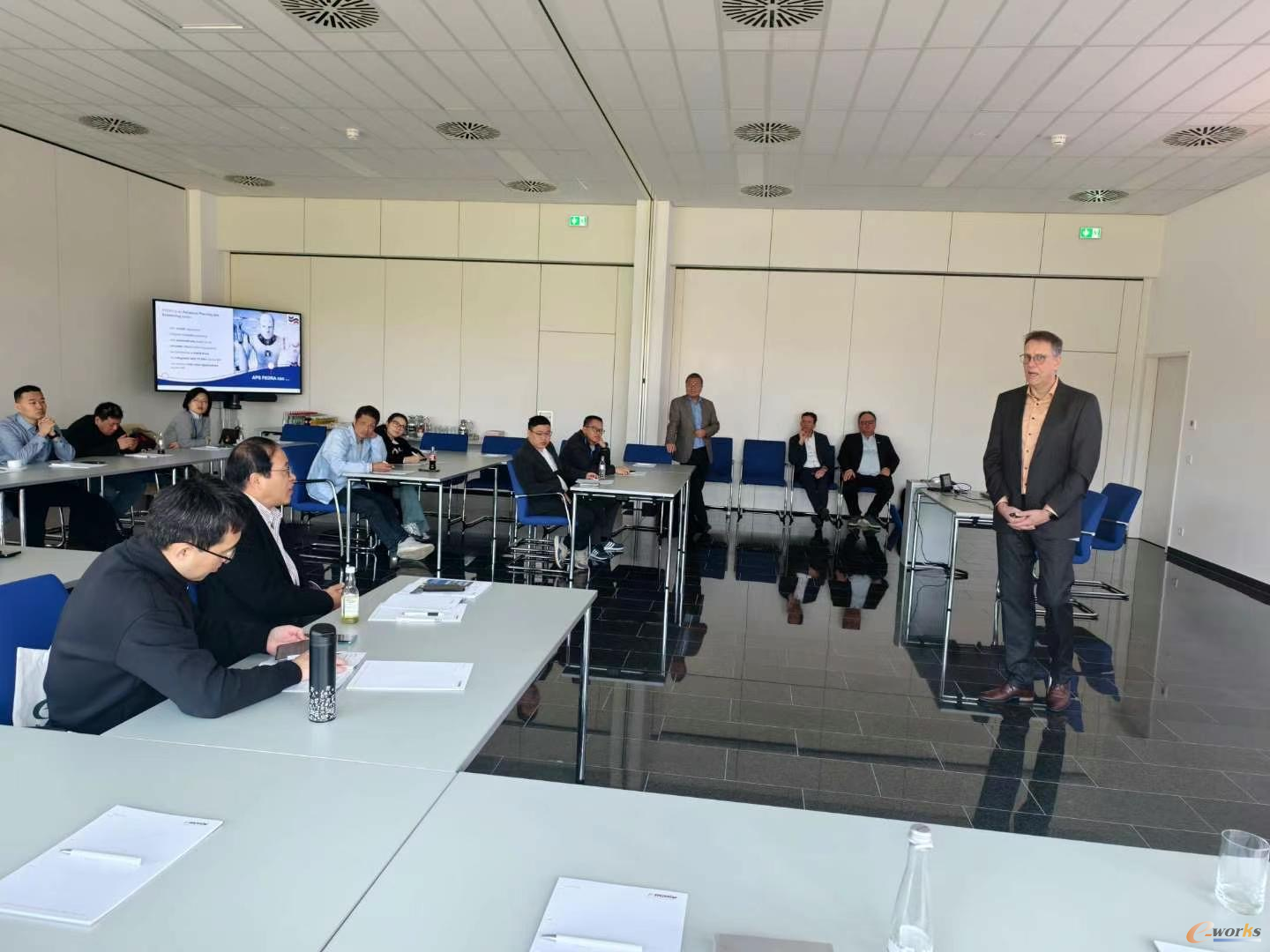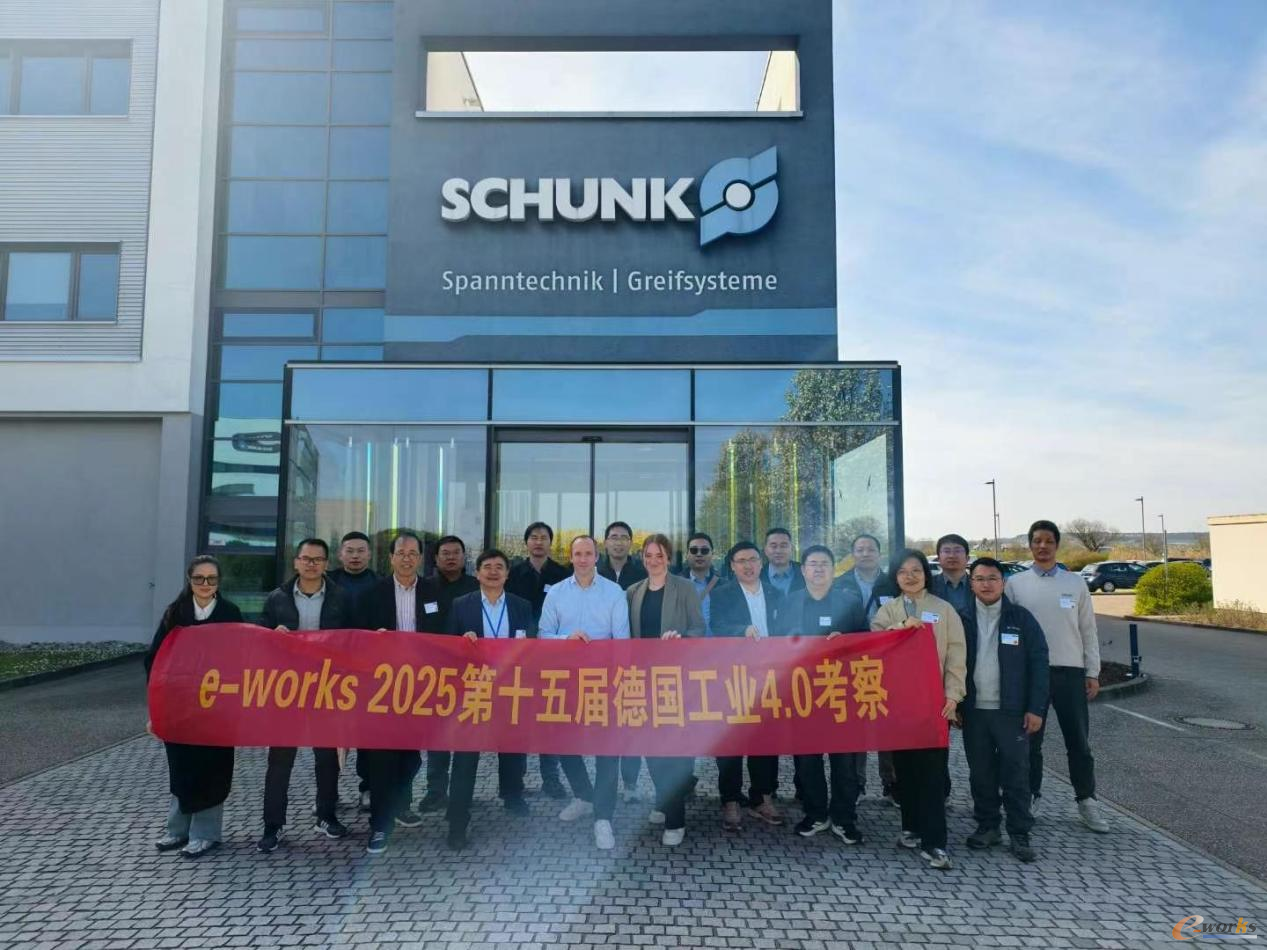e-works 15th German Industry 4.0 Delegation in 2025 Concludes Successfully
From April 2 to 11, 2025, e-works successfully organized the 15th Germany Industry 4.0 Delegation. The event brought together more than 30 senior executives from well-known enterprises, aiming to gain in-depth insights into the latest developments in German manufacturing and the cutting-edge trends and practical applications of intelligent manufacturing. As the 40th international exchange event organized by e-works, this tour provided a valuable opportunity for Chinese manufacturing to learn from global advanced experiences.
The first stop was the Smart Factory OWL laboratory. As a benchmark project of Germany's Industry 4.0 strategy, the group members deeply explored its background and core functions, witnessed on-site Industry 4.0 application scenarios such as augmented reality (AR)-based assembly guidance systems, full-process digital twin simulation platforms, and high-precision machine vision quality inspection units. The group also learned about case studies on the integrated application of technologies like reinforcement learning, machine vision, and digital twin, experiencing firsthand the complete closed-loop capability of "translating concepts into commercial reality."



The third stop was Lenze, a global leader in drive systems and automation. At its Mechatronics Competence Center (MCC), the team engaged in in-depth discussions with the enterprise on seven technological trends driving manufacturing transformation, including digital engineering design, industrial IoT, and digital services. The group explored the technical advantages and industry applications of Lenze's digital engineering software series and visited the fully open automated logistics center to experience the philosophy of transparent production.

The fourth stop was the 2025 Hannover Messe. As one of the world's most influential industrial exhibitions, the team reserved in-depth tours of booths by Siemens, ifm, Huawei, and iTAC Software AG, focusing on exhibits by FESTO, Beckhoff Automation, SEW, and others. The group experienced cutting-edge innovations such as Siemens' Industrial Foundation Model (IFM), FESTO's bionic robotics, and Beckhoff's TwinCAT CoAgent, exploring the latest trends in sustainable industrial development alongside over 3,800 exhibitors from around 60 countries and regions.


The fifth stop was Heidelberg Printing Machinery. At the Print Media Center, the team delved into the technical principles of offset, letterpress, and digital printing machines, visited the application of AI agents in procurement sourcing and big data analysis systems for production processes. The group witnessed how this century-old enterprise enhances printing quality and efficiency through technological innovation, offering end-to-end solutions covering pre-press, printing, and post-press processes.

The sixth stop was SEW-EURODRIVE's Graben-Neudorf factory in Baden-Württemberg. In the latest asynchronous motor production workshop, the team gained a comprehensive understanding of the entire process from bearing processing and rotor manufacturing to testing, inspection, and packaging. The group focused on leading applications such as supercapacitors, automated stereoscopic warehouses, and IT/OT integration, observing how hundreds of self-developed AGVs use laser navigation and intelligent scheduling to achieve efficient and safe material transportation and workstation loading, uncovering the secrets of highly automated and intelligent motor production.

The seventh stop was MPDV, an international industrial software leader. During the visit, the team explored its product lines integrating AI and digital twin technologies, including MIP platform, FEDRA, AI-Suite, and other smart factory solutions. The group learned about the methodology and case studies of integrating lean production concepts with MES system implementation and discussed MPDV's China market expansion strategy, focusing on the practical applications of the AI-Suite in workforce planning and predictive quality analysis.

The eighth stop was SCHUNK, a global leader in clamping, gripping, and automation technologies. At the smart factory, the team visited custom product R&D and testing workshops, flexible machining cells, automated storage systems, and the Collaborative Lab (Colab). The group closely observed innovative technologies such as passive adsorption mechanisms based on van der Waals forces and experienced the precision manufacturing capabilities and innovation ecosystem of this German hidden champion.

The ninth stop was Zuken's R&D center in Ulm, Germany, a global specialist in electronic and electrical system design. At the E3 Ulm R&D center, the team explored the application of Zuken E3.Series software in designing electrical control units, wiring systems, and hydraulic/pneumatic systems, including schematic diagrams, cable connection plans, and panel layouts. The group witnessed live demonstrations of how the software ensures data consistency in electrical design and integrates MCAD, ECAD, and CAM tools, covering the entire engineering chain from conceptual design to manufacturing output.


Through factory visits, exhibition tours, technical lectures, and internal discussions, the inspection team deeply experienced the essence of German manufacturing. Members recognized the strengths of German enterprises in long-termism, practical technology application, brand building, R&D innovation, and global layout. These insights provide crucial references for Chinese manufacturing during its transformation and upgrading, highlighting the significant value of e-works' international study tours.
The first stop was the Smart Factory OWL laboratory. As a benchmark project of Germany's Industry 4.0 strategy, the group members deeply explored its background and core functions, witnessed on-site Industry 4.0 application scenarios such as augmented reality (AR)-based assembly guidance systems, full-process digital twin simulation platforms, and high-precision machine vision quality inspection units. The group also learned about case studies on the integrated application of technologies like reinforcement learning, machine vision, and digital twin, experiencing firsthand the complete closed-loop capability of "translating concepts into commercial reality."

A group photo at the Smart Factory OWL Laboratory

The visit to the Smart Factory OWL Laboratory
The second stop was Phoenix Contact. At the headquarters of this century-old enterprise, the team visited injection molding workshops, fastener production lines, automated assembly lines for connectors and wire harnesses, and fully automated logistics centers. The group gained detailed insights into the independent R&D and production system for core components, observed the practical application of advanced manufacturing technologies such as industrial robotics and machine vision inspection, and learned comprehensively about the enterprise's "all-electric society" philosophy and its technological roadmap.
A group photo at Phoenix Contact
The third stop was Lenze, a global leader in drive systems and automation. At its Mechatronics Competence Center (MCC), the team engaged in in-depth discussions with the enterprise on seven technological trends driving manufacturing transformation, including digital engineering design, industrial IoT, and digital services. The group explored the technical advantages and industry applications of Lenze's digital engineering software series and visited the fully open automated logistics center to experience the philosophy of transparent production.

A group photo at Lenze
The fourth stop was the 2025 Hannover Messe. As one of the world's most influential industrial exhibitions, the team reserved in-depth tours of booths by Siemens, ifm, Huawei, and iTAC Software AG, focusing on exhibits by FESTO, Beckhoff Automation, SEW, and others. The group experienced cutting-edge innovations such as Siemens' Industrial Foundation Model (IFM), FESTO's bionic robotics, and Beckhoff's TwinCAT CoAgent, exploring the latest trends in sustainable industrial development alongside over 3,800 exhibitors from around 60 countries and regions.

2025 Hannover Messe

A group photo at 2025 Hannover Messe
The fifth stop was Heidelberg Printing Machinery. At the Print Media Center, the team delved into the technical principles of offset, letterpress, and digital printing machines, visited the application of AI agents in procurement sourcing and big data analysis systems for production processes. The group witnessed how this century-old enterprise enhances printing quality and efficiency through technological innovation, offering end-to-end solutions covering pre-press, printing, and post-press processes.

The visit to the Heidelberg Print Media Center
The sixth stop was SEW-EURODRIVE's Graben-Neudorf factory in Baden-Württemberg. In the latest asynchronous motor production workshop, the team gained a comprehensive understanding of the entire process from bearing processing and rotor manufacturing to testing, inspection, and packaging. The group focused on leading applications such as supercapacitors, automated stereoscopic warehouses, and IT/OT integration, observing how hundreds of self-developed AGVs use laser navigation and intelligent scheduling to achieve efficient and safe material transportation and workstation loading, uncovering the secrets of highly automated and intelligent motor production.

A group photo at SEW-EURODRIVE
The seventh stop was MPDV, an international industrial software leader. During the visit, the team explored its product lines integrating AI and digital twin technologies, including MIP platform, FEDRA, AI-Suite, and other smart factory solutions. The group learned about the methodology and case studies of integrating lean production concepts with MES system implementation and discussed MPDV's China market expansion strategy, focusing on the practical applications of the AI-Suite in workforce planning and predictive quality analysis.

The communication of the inspection group at MPDV
The eighth stop was SCHUNK, a global leader in clamping, gripping, and automation technologies. At the smart factory, the team visited custom product R&D and testing workshops, flexible machining cells, automated storage systems, and the Collaborative Lab (Colab). The group closely observed innovative technologies such as passive adsorption mechanisms based on van der Waals forces and experienced the precision manufacturing capabilities and innovation ecosystem of this German hidden champion.

A group photo at SCHUNK
The ninth stop was Zuken's R&D center in Ulm, Germany, a global specialist in electronic and electrical system design. At the E3 Ulm R&D center, the team explored the application of Zuken E3.Series software in designing electrical control units, wiring systems, and hydraulic/pneumatic systems, including schematic diagrams, cable connection plans, and panel layouts. The group witnessed live demonstrations of how the software ensures data consistency in electrical design and integrates MCAD, ECAD, and CAM tools, covering the entire engineering chain from conceptual design to manufacturing output.

A group photo at Zuken
The tenth stop was ifm's Tettnang factory by Lake Constance, a hidden champion in industrial sensors and automation. Received by ifm's COO, the team visited circuit board flying probe testing lines and strict sensor quality inspection processes, learning about the reliability assurance system for its 15,750 automation products. The group focused on the technical briefing of the moneo industrial IoT platform, which provides digital sensors, distributed modules, and system solutions for predictive maintenance, fault diagnosis, and energy management, demonstrating its cross-industry application capabilities.
A group photo at ifm
Through factory visits, exhibition tours, technical lectures, and internal discussions, the inspection team deeply experienced the essence of German manufacturing. Members recognized the strengths of German enterprises in long-termism, practical technology application, brand building, R&D innovation, and global layout. These insights provide crucial references for Chinese manufacturing during its transformation and upgrading, highlighting the significant value of e-works' international study tours.








